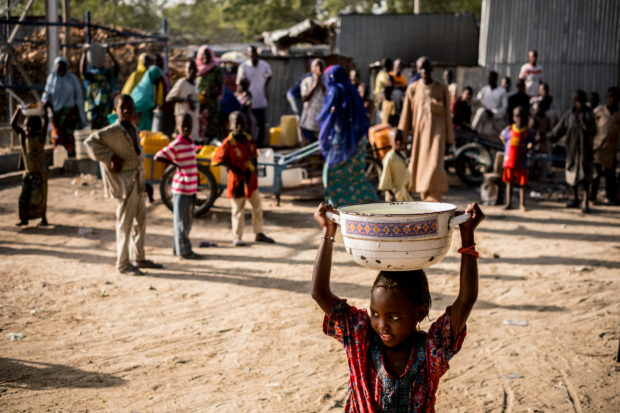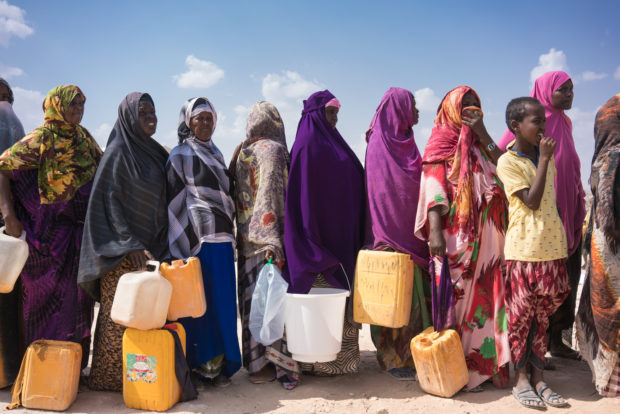Over 180M people lack drinking water in countries ravaged by conflict–Unicef

A girl carries a pan filled water pumped from a borehole provided by Unicef in Borno State, Nigeria.
NEW YORK/STOCKHOLM/MANILA -– More than 180 million people do not have access to basic drinking water in countries affected by conflict, violence and instability* around the world, Unicef warned Tuesday, as World Water Week gets under way.
“Children’s access to safe water and sanitation, especially in conflicts and emergencies, is a right, not a privilege” said Sanjay Wijesekera, Unicef’s global chief of water, sanitation and hygiene. ”In countries beset by violence, displacement, conflict and instability, children’s most basic means of survival – water – must be a priority.”
People living in fragile situations are four times more likely to lack basic drinking water than populations in non-fragile situations, according to a recent Unicef and World Health Organization analysis. Of the estimated 484 million people living in fragile situations in 2015, 183 million lacked basic drinking water services.
In the Philippines, there are significant regional disparities when it comes to accessing safe drinking water and sanitation facilities, with the conflict-affected Autonomous Region of Muslim Mindanao (ARMM) having the lowest coverage nationwide.
According to the Joint Monitoring Programme report, Progress on Drinking Water, Sanitation and Hygiene: 2017 Update and Sustainable Development Goal Baselines (UNICEF/WHO 2017), only 62 percent of households in ARMM have access to basic water services and only 22 percent of households have their own hygienic toilets (compared to, respectively, 91 percent and 75 percent at the national level).
Article continues after this advertisementThe recent outbreak of fighting in and around Marawi has further exacerbated this situation. Many of the evacuation centres are overcrowded and ill-equipped to address the water, sanitation and hygiene needs of displaced families. The available water and sanitation infrastructure in host communities is being put under considerable strain by the sudden increased numbers of people using them.
Article continues after this advertisement
Displaced women queue with containers for clean water from a Unicef and ECHO-supported clean-water tank in Galkayo, Somalia. Over 500,000 people in Somalia have been forced to leave their homes in search of food and water.
“In response to the Marawi conflict, Unicef has been working with Government and NGO partners with support from the Government of Japan and the United Nations’ Central Emergency Response Fund to address critical needs of displaced children and their families, providing water kits, hygiene kits and temporary sanitation facilities. Ensuring that children can drink clean water and practice good hygiene during emergencies is essential to protecting their health and nutritional status,” Unicef Philippines Representative Lotta Sylwander said.
In Yemen, a country reeling from the impact of over two years of conflict, water supply networks that serve the country’s largest cities are at imminent risk of collapse due to war-inflicted damage and disrepair. Around 15 million people in the country have been cut off from regular access to water and sanitation.
In Syria, where the conflict is well into its seventh year, around 15 million people are in need of safe water, including an estimated 6.4 million children. Water has frequently been used as a weapon of war: In 2016 alone, there were at least 30 deliberate water cuts – including in Aleppo, Damascus, Hama, Raqqa and Dara, with pumps destroyed and water sources contaminated.
In conflict-affected areas in northeast Nigeria, 75 percent of water and sanitation infrastructure has been damaged or destroyed, leaving 3.6 million people without even basic water services.
In South Sudan, where fighting has raged for over three years, almost half the water points across the country have been damaged or completely destroyed.
“In far too many cases, water and sanitation systems have been attacked, damaged or left in disrepair to the point of collapse. When children have no safe water to drink, and when health systems are left in ruins, malnutrition and potentially fatal diseases like cholera will inevitably follow,” said Wijesekera.
In Yemen, for example, children make up more than 53 percent of the over half a million cases of suspected cholera and acute watery diarrhoea reported so far. Somalia is suffering from the largest outbreak of cholera in the last five years, with nearly 77,000 cases of suspected cholera/acute watery diarrhea. And in South Sudan, the cholera outbreak is the most severe the country has ever experienced, with more than 19,000 cases since June 2016.
In famine-threatened north-east Nigeria, Somalia, South Sudan and Yemen, nearly 30 million people, including 14.6 million children, are in urgent need of safe water. More than 5 million children are estimated to be malnourished this year, with 1.4 million severely so.